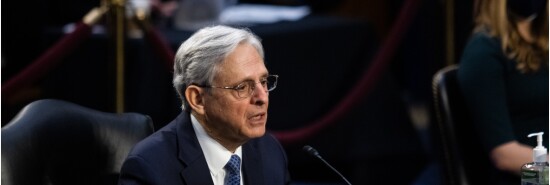
The attorney general versus whistleblowers, again
Hudson Crozier
Video Embed
Whistleblower testimony disclosed last week alleged the Justice Department manipulated the investigation into Hunter Biden to spare him from more serious charges than the ones to which he pleaded guilty. The claims disclosed flatly contradict Attorney General Merrick Garland’s promise to Congress that there would not be “interference of any political or improper kind” in the investigation.
Garland has since responded with total denial. His denials do not seem believable.
BIDEN TRIES TO SHAKE LOW MARKS ON ECONOMY WITH ‘BIDENOMICS’ PUSH
House Speaker Kevin McCarthy (R-CA) doesn’t believe them. He is floating the idea of an impeachment inquiry against Garland for possibly lying to Congress.
Trump-appointed prosecutor David Weiss was able “to prosecute any way in which he wanted to, and in any district in which he wanted to,” Garland told the House on Friday. “I don’t know how it would be possible for anybody to block him from bringing a prosecution given that he ever has this authority.”
IRS whistleblower Gary Shapley stood firm by releasing an email chain in which he summarized a meeting with Weiss to other federal investigators. Shapley alleged that a prosecutor barred Weiss from charging Biden in Washington, and the emails strongly support the claim.
“Weiss stated that he is not the deciding person on whether charges are filed,” Shapley explained in his introductory email, expressing worry that this was “inconsistent with [the Justice Department’s] position and Merrick Garland[‘s] testimony.” Interestingly, it also calls Weiss’s own sworn statements into question.
“Thanks, Gary. You covered it all,” replied an agent who was allegedly at the meeting and didn’t deny Shapley’s recollection.
If only this were the first time lawmakers had to determine whether Garland or whistleblowers were misleading the public about the integrity of the Justice Department. Alas, it’s not.
Consider cases not involving Hunter Biden. Leading up to May last year, we found out Garland’s FBI tracked parents who were angry at liberal school districts with counterterrorism “threat tags,” according to internal documents. Whistleblowers made the leaks after Garland testified that “complaining” about education policy would never “be labeled as domestic terrorism.” But the documents showed the FBI responded to terror threat reports containing no evidence of violent threats, leading the bureau to close the investigations.
In an even more suspicious instance, Garland testified that U.S. Marshals had “full authority to arrest” those who protested outside Supreme Court justices’ homes last year. Federal law prohibits even nonviolent “picketing” at a judge’s home, and Republicans wondered why many were allowed to do so after the court’s Dobbs v. Jackson Women’s Health Organization draft opinion leaked.
A Justice Department whistleblower later revealed presentation slides in which marshals were ordered to “avoid, unless absolutely necessary, criminal enforcement actions” against the protesters, noting that it would not prosecute them. The person who leaked the slides was “concerned about [Garland’s] misleading testimony,” according to the senator who obtained them.
Garland’s explanation under oath? “I’ve never seen those slides.”
The attorney general is either willfully or unwittingly allowing his agency to adopt politically biased standards, and he is running out of ways to hide it. He expects us to believe that every credible source from within the government is lying when he is the only common denominator in each case. Responding to a reporter on Friday, Garland claimed hysterically that the criticism “constitutes an attack on an institution that is vital to American democracy.”
The United States didn’t have a Justice Department until 1870. What is vital is the rule of law, not institutions that subvert it. That is what Garland’s agency is credibly accused of doing.
CLICK HERE TO READ MORE FROM THE WASHINGTON EXAMINER
Hudson Crozier is a summer 2023 Washington Examiner fellow.
